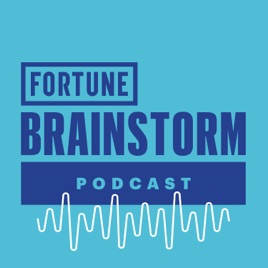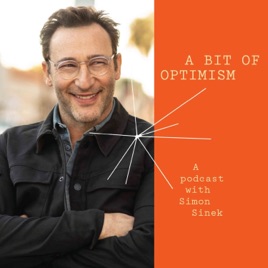
Advertise on podcast: Brainstorm
Rating
4.7 from
Country
This podcast has
42 episodes
Language
Publisher
Explicit
No
Date created
2020/09/24
Average duration
27 min.
Release period
7 days
Description
Technology is disrupting our world and reshaping our lives, sometimes in ways we don't realize. In this weekly podcast, Fortune Senior Writer Michal Lev-Ram and Deputy Editor Brian O'Keefe dig behind the headlines to explore the world of tech. They speak with leaders of some of the biggest companies - and others perhaps you've never heard of - and call on industry experts for insight. Fortune's team of tech reporters and writers also weighs in on what's happening in technology news and why it matters for everyone.
Podcast episodes
Check latest episodes from Brainstorm podcast
Technology at the Summer Olympics
2021/07/29
The last time Tokyo hosted the Summer Games was 1964. That was the first Olympics to be televised live, around the world, and in color. The event continues to be a hotspot of innovation for broadcast. Tuning in this year you may hear mention of an athlete's metabolic data, or analysis comparing the acceleration of runners. New tech is capturing this information and spitting out the details within seconds. In today's Brainstorm you'll learn about a variety of ways technology is improving the Olympic viewing experience - providing more data and cooler camera angles than ever before.
Also in today's episode, how athletes are increasingly using technology to improve their skills, and how one Olympic team is employing a unique product to protect against COVID-19.
Guests include Gary Saunders, president of Kontrol Biocloud; Rick Echevarria, general manager of Intel's Olympics and Paralympics Program; and Ashton Eaton, a gold-medal Olympian, product engineer at Intel and advisor to the Wu Tsai Human Performance Alliance.
more
The Billionaire Space Race
2021/07/22
In the past two weeks, both Sir Richard Branson and Amazon's Jeff Bezos flew into space on their own rockets. Space tourism, they say, is just around the corner: anyone who can pay the price of admission can now travel outside our home planet. In the flurry of headlines that followed, it’s easy to forget these billionaire-astronauts – along with Elon Musk – have been investing heavily in the commercial space industry for nearly two decades. There’s an obvious, immediate business case: Satellites help fuel the information economy. But the longer-term ambitions of a commercial space sector are deeply imaginative, if not fanciful. Human colonies on the moon, earth-orbiting-hotels, mining asteroids for precious metals.
On today’s Brainstorm, Michal Lev-Ram and Brian O’Keefe discuss the rise of the commercial space sector and the technological breakthroughs it hopes to realize.
Christian Maender, director of in-space manufacturing and research at unicorn Axiom Space, describes the company’s plans to build the first private space station.
Peter Hughes, the Center Chief Technologist for NASA’s Goddard Space Flight Center applauds the space-minded venture capitalists. Up in orbit, he says, the more the merrier.
Also in the episode, Mehak Sarang, research associate at Harvard Business School, discusses the limitless possibilities for scientific and technological breakthroughs that space affords.
more
The Growing Power of No-Code/Low-Code Software Development
2021/07/15
In a digital world, the ability to code – to train a computer, using its own language – is key, hence the enormous push to make people literate in programming languages. “Don’t just play on your phone,” urged President Barack Obama in 2013, “program it.”
But today the demand for digital applications outstrips the programming talent. The became especially clear during COVID-19, when digital accessibility became a necessity. Enter low-code and no-code application development: Platforms where software is configured visually, using drag and drop interfaces. They’re faster and cheaper to use than traditional coding, but how well do they work?
On today’s Brainstorm, Brian O’Keefe and Fortune’s Robert Hackett discuss the promise of low-code and no-code platforms, and how they've stood the test of emergency situations brought on by the COVID-19 pandemic.
Laela Sturdy is a general partner at CapitalG, Alphabet’s independent growth fund, which helps growth-stage tech companies scale. She says the attraction of these platforms is to enable creators and non-technical people to access the power and magic of code.
Michael Beckley is the Chief Technology Officer of Appian, the first company to go public as a low-code vendor. He says low-code has the power to deliver clients perfectly tailored software in half the time.
Also in this episode, Veronica Soto, director of San Antonio’s Neighborhood and Housing Services Department describes digitizing an entire rental assistance program in a week, at the outset of the pandemic, in partnership with low-code platform Mendix.
more
Presenting: Magic Leap CEO Peggy Johnson on Leadership Next
2021/07/08
Fortune's Brainstorm podcast is on vacation this week, but will return next Thursday with a new episode. In the meantime, we bring you another Fortune podcast: Leadership Next (subscribe wherever you get your podcasts). Each Week, Alan Murray and Ellen McGirt interview CEOs from major companies like Intel, Hilton and Etsy.
This episode of Leadership Next features Peggy Johnson, CEO of Magic Leap. The company's augmented headset never really took off with consumers, so now, Magic Leap is on a mission to find new users for its technology.
Peggy spoke with Alan and Ellen earlier in the year.
more
When Will Autonomous Cars Become Reality?
2021/07/01
Driverless cars are supposed to eliminate traffic, prevent millions of deaths and injuries, reduce congestion, and slash carbon emissions. And, they were supposed to be on our streets by now. In 2016, then-Secretary of Transportation, Anthony Foxx, now the Chief Policy Officer at Lyft, said in an interview that by 2021 “families will be able to walk out of their homes and call [an autonomous] vehicle, and that vehicle will take them to work or to school.” He wasn't the only one to make such claims.
On today’s Brainstorm, Michal Lev-Ram and Brian O’Keefe examine why autonomous vehicles (AVs) have yet to go mainstream, and what needs to happen in order for us to take our hands off the wheel.
Laura Major is coauthor of the book “What to Expect When You’re Expecting Robots” as well as the Chief Technology Officer for Motional. Motional is a joint venture between Hyundai and Aptiv, currently partnering with Lyft on robotaxis in Las Vegas. She explains the experience of riding in a robotaxi, and how the company is approaching technical challenges it's facing.
Jody Kelman, the General Manager of Lyft Autonomous, talks about what needs to happen for riders to feel comfortable in AVs, and about consolidation in the industry.
Also in this episode, Missy Cummings of Duke University and Rob Seamens of NYU explain the hype behind AVs, the unresolved technological hurdles, and the regulatory ambiguity that stands in the way of widespread adoption.
more
Solving the Semiconductor Shortage
2021/06/24
Semiconductors are an essential part of computer chips and, therefore, power much of the technology our modern world increasingly relies upon. This is especially the case during the COVID-19 pandemic, as demand for personal electronics and internet connectivity has skyrocketed. Along with toilet paper and lumber, though, semiconductors are in short supply, due to erratic, pandemic-related bottlenecks in the global supply chain. But simply making more semiconductors isn’t so easy.
On today’s Brainstorm, Michal Lev-Ram and Brian O’Keefe dive into the reasons for the semiconductor shortage, and explore what solutions exist in the near and long term.
Margaret O’Mara, a professor of history at the University of Washington and author of “The Code: Silicon Valley and the Remaking of America,” describes how Silicon Valley is what it is because of the semiconductor industry and the U.S. government.
Ondrej Burkacky leads McKinsey's global Semiconductors and Business Technology practices; he explains why semiconductor manufacturing is so time and capital-intensive, and how the industry can avoid future shortages.
Also in this episode, Tyson Tuttle, CEO of Silicon Labs in Austin, Texas, describes the importance of geographic diversity in semiconductor manufacturing, and what role the government should play in preventing future shortages.
more
Is Cryptocurrency Bad for the Environment?
2021/06/17
Over the past year, cryptocurrencies like Bitcoin and Ethereum have garnered lots of attention, due to their meteoric rise in value. Even Dogecoin, which began as a spoof, had a market cap larger than that of Ford Motor Company this spring. But there’s a growing awareness of the massive computing power these currencies require; how can something as intangible as cryptocurrency have such an enormous environmental footprint?
On today’s Brainstorm, Michal Lev-Ram and Brian O’Keefe examine why Bitcoin mining, specifically, is so energy intensive, and what makes some of the alternatives "greener." Fortune’s Robert Hackett explains the relationship between cryptocurrency mining and blockchain technology, and why the worldwide quest to solve a complex mathematical puzzle consumes more energy than entire countries like Argentina, or Ukraine.
Alex de Vries, a financial economist and author of the Digiconomist blog, which tracks Bitcoin's energy consumption, says the more valuable Bitcoin becomes, the more incentive there is to mine it.
And Frederik Gregaard, CEO of the Cardano Foundation, explains why his cryptocurrency - ADA - is more environmentally friendly than the likes of Bitcoin and Ethereum.
more
More People Moving Their Financial Lives Online
2021/06/10
When was the last time you visited a bank branch? Called a broker to make a stock trade? Paid the babysitter in cash? Increasingly, our financial lives are online. And in today's Brainstorm podcast we dig into the growth of the fintech industry.
First up, Matt Harris, a partner at Bain Capital Ventures. He's been closely following - and investing in - the intersection of finance and technology for over twenty years.
Zach Perret is the co-founder and CEO of Plaid whose technology allows many of your favorite financial apps to connect with your bank account. The number of fintech companies has exploded since Zach and his partner first started building Plaid - he outlines the changes he's seen, and how the pandemic has accelerated adoption of digital finance.
And, Cristina Junqueira is the co-founder of Latin America's largest fintech company - Nubank, based in Brazil. What started as a no-fee credit card offering has grown to an expansive suite of products with over 40 million customers. She talks about the challenges of starting a digital bank, and the current struggle to find enough talent to keep up with Nubank's growth.
more
Marc Benioff and Others Talk Tech Trends
2021/06/03
Ever since 1955 Fortune has published the Fortune 500 - a list of the country's biggest companies, ranked by revenue. And each year, that list reflects the biggest trends in business. This year, one trend stands above all others: technology is pushing business to new heights.
The technology sector pulled in more profits than any other, and its market cap continues to grow. Scott DeCarlo, Fortune's list editor, breaks out some of the most telling stats.
Also on today's show, Marc Benioff of Salesforce whose company illustrates the growth trajectory of many Fortune 500 tech companies. Plus, Ernie Garcia the CEO of Carvana whose digital platform for buying and selling cars was a big pandemic winner and landed on the 500 list for the first time.
more
Can Silicon Valley Build a Better Burger?
2021/05/27
Summer is right around the corner which means ... grilling! And this season there are more plant-based meats on the market than ever before. But startups are increasingly using other methods to develop alternative proteins too - and investors are flocking to support their efforts.
Today's Brainstorm podcast is all about these alternative meats: the case for developing them, how Silicon Valley is embracing the challenge, who is most interested in backing these companies and - perhaps most importantly - do they taste good?
Fortune senior writer Beth Kowitt wrote her first big feature on the industry in 2017 and has been following it closely ever since. She gives Brian O'Keefe and Michal Lev-Ram an industry overview.
Kowitt also interviews Lisa Dyson, the founder and CEO of Air Protein. A young company that - yes - aims to make alternative protein from the elements found in air.
Finally, hear from Sharyn Murray of The Good Food Institute. She has a slew of data about who is investing in this industry and where the money's going - plus an interesting argument that the government should be playing a larger role in encouraging the adoption of meatless meat.
AND ... don't miss Brian's first taste of a plant-based meat alternative!
more
Can Tech Fix Our Traffic Woes?
2021/05/20
Over the course of 2020, when car trips were at a minimum due to the pandemic, Americans still spent a day of their lives, on average, sitting in traffic. Things were much worse pre-pandemic: In 2019, the average driver in Los Angeles spent almost 120 hours in traffic—nearly an entire work week. Traffic is one of the foremost inconveniences of modern life; it’s also unhealthy, inefficient and wasteful, which is why technologists are leveraging the power of data and machine learning to beat back it back.
On today’s Brainstorm, Michal Lev-Ram and Brian O’Keefe explore the technology behind solving system-wide traffic and mobility issues.
Tiffany Chu, SVP of Remix at Via, a mobility platform, explains how COVID has forced cities to quickly rethink the best ways for people to get around.
Jibo Sanyal, a computer scientist with Oak Ridge National Laboratory in Tennessee, discusses his work with the city of Chattanooga to create a “digital twin” of the city, thanks to its traffic sensors, enabling them to find solutions to traffic problems virtually, before implementing them in real life.
Also in this episode, Karina Ricks, Director of the city of Pittsburgh’s Department of Mobility and Infrastructure explains where the city is using adaptive traffic lights, which sense the traffic demand and time the lights accordingly, and where it’s not.
more
The Power of Virtual Reality in Healthcare
2021/05/13
Virtual reality (VR) is no longer futuristic fantasy: it’s a growing market across many industries, from gaming to education. In healthcare, doctors, nurses and therapists are immersing patients in computer-generated, interactive environments. And while it's no silver bullet, VR is proving to be powerful medicine. Studies show it can improve health outcomes in many situations, whether in labor and delivery, managing chronic pain, or for treating conditions like depression and anxiety.
On today’s Brainstorm, Michal Lev-Ram and Brian O’Keefe explore how VR works is being used by doctors and therapists, and its limitations.
Dr. Brennan Spiegel, Director of Health Services Research at Cedars-Sinai Hospital in Los Angeles and the author of "VRx: How Virtual Therapeutics Will Revolutionize Medicine" explains VR gives patients an alternative to traditional pain medication.
Xavier Palomer is CEO of Psious, a company that designs VR applications for mental health treatment. He explains how the technology helps patients overcome phobias.
Also in this episode, Tom Norris, a medically retired Lieutenant Colonel in the U.S. Air Force, explains his decades-long struggles with chronic pain and how VR has enabled him to better manage it.
more
Podcast sponsorship advertising
Start advertising on Brainstorm & sponsor relevant audience podcasts
You may also like these business Podcasts

4.9
753
345
The Home Service Expert Podcast
Tommy Mello: $100 Million Founder|Forbes, Inc., Entrepreneur Columnist

4.8
1517
117
A Bit of Optimism
iHeartPodcasts

5
11113
749
Money Rehab with Nicole Lapin
Money News Network

4.6
1168
2000
Marketing School - Digital Marketing and Online Marketing Tips
iHeartPodcasts

4.9
29486
637
Jocko Podcast
Jocko DEFCOR Network

4
864
1000
Wall Street Breakfast
Seeking Alpha

4.9
12832
375
THE ED MYLETT SHOW
Ed Mylett | Cumulus Podcast Network

4.1
1056
501
Investing in Real Estate with Clayton Morris | Investing for Beginners
Clayton Morris

4.8
1897
443
Creative Pep Talk
Andy J. Pizza

4.4
5524
181
All-In with Chamath, Jason, Sacks & Friedberg
Jason Calacanis



